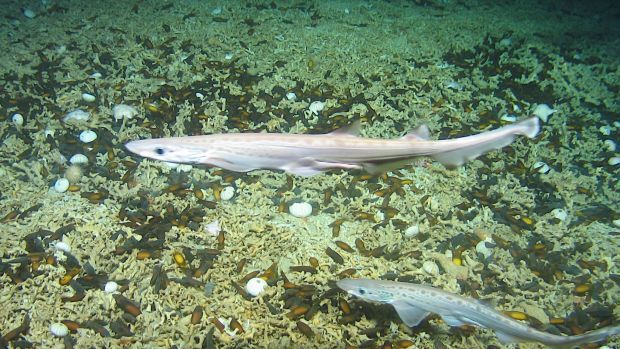Shark nursery discovered off the west coast of Ireland
Scientists have identified an area where female sharks lay eggs -200 nautical miles off the west coast of Ireland, in one of the states offshore Marine Protected Areas (MPA's).
The rare shark nursery was discovered in July during a "SeaRover" survey by the Marine Institute, using the remotely operated vehicle (ROV) Holland 1 , deployed from Irish Lights ship Granuaile.
The ROV filmed a large school of blackmouth catshark ( Geleus melastomus) and an abundance of mermaids purses (shark egg cases) on the seabed at 750 meters depth. A second even more less known solitary species, the sailfin roughshark ( Oxynotus paradoxus ) was also recorded during the survey. The two rarely sighted species are of much scientific interest given their elusive life history strategies and the fact that both are on the IUCN "Red List" of threatened species, meaning Ireland is obligated to monitor these deepwater sharks under the Marine Strategy Framework Directive.
Video of shark nursery discovery by Chief Scientist David O'Sullivan.
The blackmouth catshark, of the family Scyliorhinidae, is common in the north-east Atlantic Ocean from Iceland to Senegal, including the Mediterranean Sea, typically found over continental shelf slopes at depths of 150- 1,400 meters on or near muddy substrates. This shark is an active generalist predator that forages on both bottom- dwelling and free-swimming prey. It's diet is primarily composed of decapods, krill and bony fishes (including lanternfish, bristlemouths, dragonfishes, and moras), they also feed on cephalopods. Adults have been shown to feed on larger prey and even take other elasmobranchs (sharks, skates and rays).
Unlike most members of it's genus, the blackmouth catshark exhibits multiple oviparity, in which more than one egg can mature within each oviduct simultaneously. Females may contain up to 13 developing eggs, though 1-4 per oviduct is more typical. The number of eggs laid annually can vary from an estimated 60 to 100, increasing with female size (Capape & Zaouali, 1997).
This important nursery was discovered in one of Ireland's six offshore Special Area's of Conservation (SPA) and may indicate that large numbers of females gather in this particular habitat to lay eggs on the seabed. Scientists at the Marine Institute said " This discovery shows the significance of documenting sensitive marine habitats, and will give us a better understanding of the biology of these beautiful animals and their ecosystem function in ireland's biologically sensitive area".
In addition the survey led by expedition scientists, Professor Louise Allcock and David O'Sullivan of NUIG, revealed deepwater "black" corals, a species of octocoral and an entire reef of sponges recorded on the Porcupine and Rockall Banks at 2,991 meters depth, some 300 nautical miles off the coasts of Co. Kerry, Galway and Co. Mayo .
Tribute has been made to the EU's European Maritime and Fisheries Fund for supporting the survey, co-ordinated by Infomar, the extensive seabed mapping programme conducted by the Geological Society of Ireland and the Marine Institute, combining the efforts of a variety of scientists from the National Parks and Wildlife Service, NUI, Galway, Plymouth University and Aquafact.
© Ocean Research & Conservation Ireland (ORCireland) and www.orcireland.ie , est. 2017. Unauthorized use and/or duplication of this material without express and written permission from this site’s author and/or owner is strictly prohibited. Excerpts and links may be used, provided that full and clear credit is given to Ocean Research & Conservation Ireland and www.orcireland.ie with appropriate and specific direction to the original content.
Reference:
Capapé, C. & J. Zaouali (1977). "Biology of Scyliorhinidae from Tunisian coasts 6 G. Galeus melastomus Rafinesque, 1810: bathymetric and geographical distribution, sexuality, reproduction, fecundity". Cahiers de Biologie Marine. 18 (4): 449–463.
SHARE THIS ARTICLE














